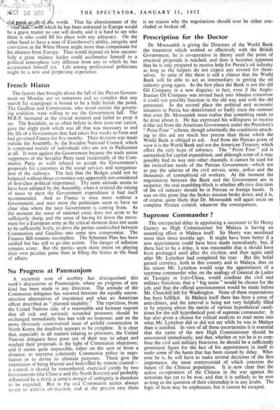French Hiatus
The factors that brought about the fall of the Pleven Govern- ment on Monday are so numerous and so complex that any search for scapegoats is bound to be a little beside the point. The Gaullists and Communists, who stood outside the govern- ing coalition, were willing to see the Government fall. The M.R.P. hesitated at the crucial moment and failed to prop it up. The Socialists, as so often before in their post-war career, gave the slight push which was all that was necessary to end the life of a Government that had taken five weeks to form and had governed France for five months. Their decision was made outside the Assembly, by the Socialist National Council, which is composed mainly of individuals who are not in Parliament at all. It went against the Government because the trade union supporters of the Socialist Party (and incidentally of the Com- munist Party as well) refused to accept the Government's proposals for economies in the social services and reorganisa- tion of the railways. The fact that the Budget could not be balanced without those economies was apparently not considered of first-class political importance. The same attitude seems to have been adopted by the Assembly, when it resisted the raising of taxes to meet the Government expenditure it had itself recommended. And so France is once more without a Government, and once more the politicians seem to have no clear idea where the next Government is coming from. At the moment the sense of national crisis does not seem to be sufficiently sharp, and the sense of having let down the move- ment for a European army at the critical moment does not seem to be sufficiently lively, to drive the parties sandwiched between Communists and Gaullists into some new compromise. The Finance Bill remains incomplete. The Schuman Plan has been ratified but has still to go into action. The danger of inflation remains acute. But the parties seem more intent on playing their own peculiar game than in filling the hiatus at the head of affairs.


































 Previous page
Previous page